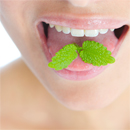 Chronic bad breath, which is also referred to as halitosis is an annoying and embarrassing problem that one in four adults suffers with. If you are sick and tired of dealing with halitosis, take heart because it is treatable–all you have to do is consider the following causes and follow the treatment protocols laid out below.
Chronic bad breath, which is also referred to as halitosis is an annoying and embarrassing problem that one in four adults suffers with. If you are sick and tired of dealing with halitosis, take heart because it is treatable–all you have to do is consider the following causes and follow the treatment protocols laid out below.
Cause #1: Improper Dental Hygiene
Advertisement
If you do not brush and floss your teeth regularly and thoroughly, small particles of food will remain not only on your teeth and gums but also in the rest of your mouth. After a while, the food particles will begin to decay and rot and this causes a foul smelling odor. In addition, bacteria will grow on these food particles and the bacteria themselves cause an additional unpleasant odor.
Treatment:
Brush your teeth after every meal, and don’t forget to clean your gums. You may also want to consider using an automatic toothbrush, because the vibration helps to ensure that each and every tooth is left debris free. The American Dental Hygienists Association recommends using a toothbrush with soft, nylon, round-ended bristles, in order to effectively prevent decay and simultaneously prevent irritating your gums. Be sure to maintain a 45-degree angle with the toothbrush bristles contacting the surface of each tooth as well as the gumline. You should also floss at least once per day, to remove the hidden food particles that are stuck on your gums and between your teeth.
Cause #2: Neglecting Your Tongue
If you meticulously clean every tooth and your gums are healthy, but you still suffer from bad breath, the cause of your halitosis may be an unkempt tongue. Plaque and bacteria stick to your tongue and some dentists liken your tongue to a shabby carpet, because all kinds of smelly bacteria can hide there. No matter how clean your teeth are, if your tongue is laden with bacteria, you will not eliminate your bad breath.
Treatment:
Always brush your tongue with your toothbrush after you have brushed your teeth. Better yet, buy a tongue scraper which is specifically designed to remove the bacteria that cause bad breath and tooth decay. Also, it is recommended that you clean your entire tongue, right back to your tonsils.
Cause #3: An Old Toothbrush
There are thousands of microbes on your toothbrush bristles, some of which are bacterial in nature. These bacteria not only cause bad breath, they can also cause gingivitis and periodontitis—two health conditions which will exacerbate your bad breath. Also, once your toothbrush becomes frayed, it loses its ability to properly remove the food particles that cause bad breath, unhealthy gums and tooth decay.
Treatment:
This is an easy fix, replace your toothbrush every three months, or as soon as you notice the bristles have started to spray and fray. In order to prevent your toothbrush from becoming a bacterial playground you can also leave it in a cup of hydrogen peroxide overnight.
Cause #4: Dry Mouth
You saliva helps to wash food and odor causing bacteria away. It also has antiseptic properties that help to kill the bad breath causing bacteria in your mouth.
Treatment:
Advertisement
There are many possible causes of dry mouth, and it is a common side-effect of certain medications such as antidepressants. If this is the case for you, consider asking you doctor about switching medications. Alternatively, seek the advice of a holistic health practitioner in order to address the root cause of your condition and eliminate the need for medications all together. If you have a chronic dry mouth and it is not due to medications, you can remedy the problem by staying hydrated and drinking at least 8 cups of water per day. Chewing sugar-free gum is also helpful because it stimulates the production of saliva. You may also want to reduce or eliminate your consumption of alcohol and caffeinated beverages because both of them can cause a dry mouth.
Cause #5: Diet
Your diet has a substantial impact on the odor of your breath. The reason for this is because after eating, your body digests that food and it gets absorbed into your bloodstream and then your lungs expel it when you breathe. Fasting and certain diets such as low-carb diets can lead to bad breath because the lack of food causes your body to break down stored fat and protein and this causes foul smelling metabolic wastes to be expelled from your lungs. A diet high in sugar can also inadvertently lead to bad breath, because the sugars get stuck on each and every tooth and overtime this will cause foul-smelling tooth decay. Finally, Phyllis Balch recommends in her book “Prescription for Nutritional Healing” avoiding the following foods: spicy foods, anchovies, blue cheese, garlic, onions, pepperoni, pastrami, salami, tuna and camembert because they can release an unpleasant odor for up to twenty-four hours after consuming them and no amount of oral hygiene will mask it.
